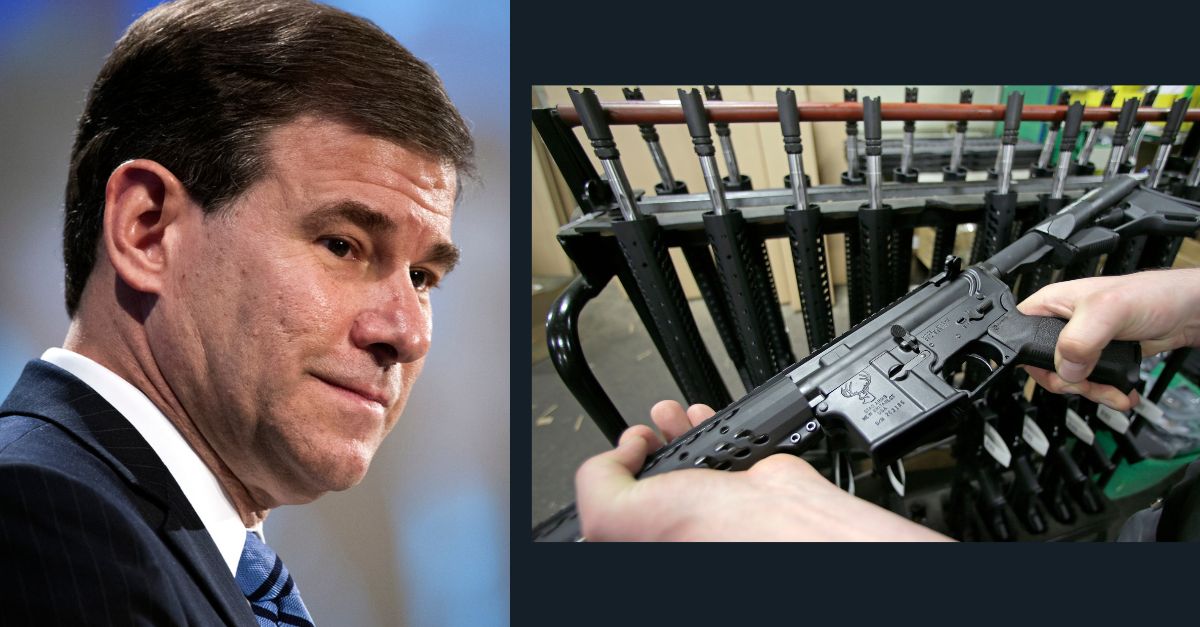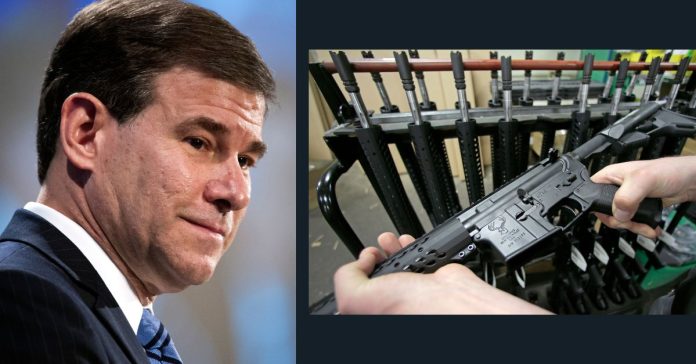
Left: Chief Judge William Pryor, U.S. Court of Appeals, Eleventh Circuit (AP Photo/Cliff Owen); Right: FILE – In this April 10, 2013 file photo, craftsman Veetek Witkowski holds a newly assembled AR-15 rifle at the Stag Arms company in New Britain, Conn, Wednesday, April 10, 2013. (AP Photo/Charles Krupa).
A federal appeals court ruled Tuesday that the Supreme Court’s dramatic expansion of gun rights in the 2022 case New York Rifle Assn. v. Bruen does not mean that a federal ban on felons possessing firearms is now unconstitutional.
Andre Dubois tried to ship firearms wrapped in aluminum foil and hidden inside two deep fryers from an Express Copy Print & Ship store in Georgia to the Commonwealth of Dominica in 2018. The package was X-rayed while in transit, and federal officials seized the shipment and charged Dubois with attempting to smuggle firearms, delivering firearms to a common carrier for shipment without written notice, and possessing a firearm as a felon under 18 U.S.C. § 922(g)(1), known as the federal “felon in possession” statute.
Dubois appealed his convictions on a number of grounds, and while those appeals were pending, the Supreme Court handed down the Bruen decision. In June 2022, the six-member Bruen majority, led by Justice Clarence Thomas, said New York’s gun licensing regulations were unconstitutional because they restricted gun rights in a way that was not sufficiently grounded in “historical tradition” to satisfy the mandates of the Second Amendment.
Dubois did not dispute that he violated the federal statute, but he argued that his conviction should be vacated because the law — as now clarified under Bruen — violated his Second Amendment rights. Dubois’s claim rested on the argument that the Court’s ruling in Bruen “abrogated” — or demolished — an earlier precedent that upheld the felon in possession statute.
Although the Bruen ruling has become the basis for striking down gun regulations in a number of contexts, the U.S. Court of Appeals for the 11th Circuit ruled that the felon in possession statute still stands.
Chief U.S. Circuit Judge William Pryor, a George W. Bush appointee, penned the opinion for the three-judge panel which also included U.S. Circuit Judges Robin Rosenbaum, a Barack Obama appointee, and Nancy Abudu, a Joe Biden appointee. The three agreed that the prior precedent upholding the federal felon in possession statute was not abrogated by the Bruen ruling and that Dubois’ constitutional rights were not violated by his conviction.
Pryor wrote that rather than abrogating any prior precedents, the Bruen ruling reinforced the holding of District of Columbia v. Heller — that unfettered gun rights extend only to “law-abiding, responsible citizens.” Nothing in Bruen or other cases since then has changed that, said Pryor.
The 11th Circuit’s ruling is not the first time a federal court has considered the federal felon in possession statute set against a post-Bruen landscape. Other federal courts have also ruled that the Bruen ruling did not expand gun rights to the extent that felons must now be allowed to possess firearms. However, the issue seems destined for a circuit split that will end up back before the Supreme Court justices.
A Chicago judge ruled in November that there is insufficient historical basis to subject felons to a “lifetime of disarmament,” but said the issue was a “close question.” The appeal of that decision is now pending in the U.S. Court of Appeals for the Seventh Circuit.
Given the likelihood that the fate of the federal felon in possession statute will yield conflicting circuit court holdings, the issue is ripe for an eventual showdown at the highest court in the nation — a court that has already shown itself to be very supportive of wide interpretations of the Second Amendment.
Have a tip we should know? [email protected]

